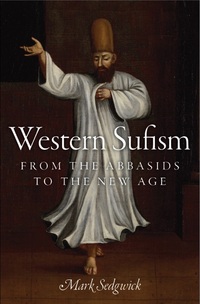Western Sufism: From the Abbasids to the New Age

Western Sufism: From the Abbasids to the New Age is published by Oxford University Press in New York (2016).
It is the first complete history of the Western relationship with Sufism, and examines the deep roots of Western Sufism, both in the Muslim world and in the West. Although the first significant Western Sufi organization was not established until 1915, the first Western discussion of Sufism was printed in 1480, and Western interest in some of the ideas that are central to Sufi thought goes back to the thirteenth century.
Western Sufism starts with the earliest origins of Western Sufism in late antique Neoplatonism and early Arab philosophy, and traces later origins in repeated intercultural transfers from the Muslim world to the West, in the thought of the European Renaissance and Enlightenment, and in the intellectual and religious ferment of the nineteenth century. It follows the development of organized Sufism in the West from 1915 until 1968, the year in which the first Western Sufi order based not on the heritage of the European Middle Ages, Renaissance and Enlightenment, but rather on purely Islamic models, was founded. Later developments in this and other orders are also covered.
It is the first complete history of the Western relationship with Sufism, and examines the deep roots of Western Sufism, both in the Muslim world and in the West. Although the first significant Western Sufi organization was not established until 1915, the first Western discussion of Sufism was printed in 1480, and Western interest in some of the ideas that are central to Sufi thought goes back to the thirteenth century.
Western Sufism starts with the earliest origins of Western Sufism in late antique Neoplatonism and early Arab philosophy, and traces later origins in repeated intercultural transfers from the Muslim world to the West, in the thought of the European Renaissance and Enlightenment, and in the intellectual and religious ferment of the nineteenth century. It follows the development of organized Sufism in the West from 1915 until 1968, the year in which the first Western Sufi order based not on the heritage of the European Middle Ages, Renaissance and Enlightenment, but rather on purely Islamic models, was founded. Later developments in this and other orders are also covered.
Contents
Introduction
|
Part I | Premodern Intercultural Transfers
1. Neoplatonism and Emanationism
2. Islamic Emanationism
3. Jewish and Christian Emanationism
|
Part II | Imagining Sufism, 1480- 1899
4. Dervishes
5. Deism and Pantheism
6. Universalist Sufism
7. Dervishes Epicurean and Fanatical
|
Part III | The Establishment of Sufism in the West, 1910- 1933
8. Transcendentalism, Theosophy, and Sufism
9. Toward the One: Inayat Khan and the Sufi Movement
10. Tradition and Consciousness
|
Part IV | The Development of Sufism in the New Age
11. Polarization
12. Idries Shah and Sufi Psychology
13. Sufism Meets the New Age
14. Islamic Sufism
|
15. Conclusion
Selected Bibliography
Index
Selected Bibliography
Index
Comments
“The list of intellectuals who have sneered at twentieth-century Western Sufis as peddling some form of ‘neo-Sufism’ or ‘New Age syncretism’ is long and depressing. In his new book, Mark Sedgwick impressively corrects this consensus by giving us the long arc. He traces the Christian and Jewish engagement with Sufism back to the fifteenth-century Renaissance, and then traces the mystical lingua franca of these transcultural transmissions even further back, through Arab and Scholastic philosophy and, finally, to the towering figure of Plotinus. Throughout it all, Sedgwick demonstrates an intellectual and spiritual generosity that is rare among scholars of this erudition and accomplishment. The implications are significant and far-reaching for any number of intellectual projects, from the histories of Islam, Christianity, and Judaism to the re-visioning of comparativism for a new generation.”—Jeffrey J. Kripal, author of The Serpent’s Gift: Gnostic Reflections on the Study of Religion.
“This is the book on Sufism that I always wanted to read, but that I just couldn’t find because Mark Sedgwick had not yet written it. Is Sufism Islamic or universal? Is it a historical phenomenon or a product of the imagination? Does it come from the East or the West? Is it one thing or many things? As it turns out, the answer to all these questions is ‘both’ – and yet there is something that holds it all together: the Platonic dream of reunion with the One True Reality that is hidden and yet made visible by the veil of appearances.”—Wouter J. Hanegraaff, Professor of History of Hermetic Philosophy and Related Currents, University of Amsterdam.
“This work is both provocative and thought-provoking. Not only is it the first serious study of Sufism in the West but it also provides an argument for both Sufism and Islam as ‘Western’ spiritual traditions through the shared heritage of Neoplatonism. Besides providing important new material for scholars and students of Sufism, this book is also useful for both graduate and undergraduate courses on Sufism, Orientalism, Esotericism, and Religious Studies and Islamic Studies in general.”—Vincent J. Cornell, Asa Griggs Candler Professor of Middle East and Islamic Studies, Emory University.
Site powered by Weebly. Managed by iPage
